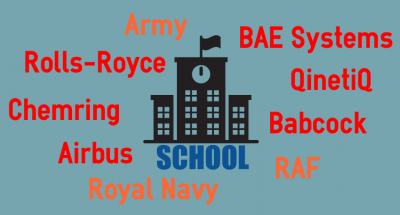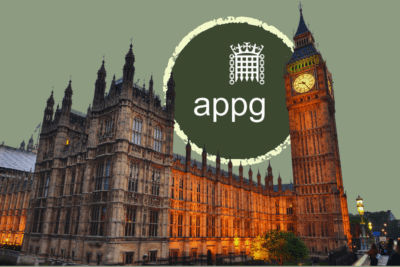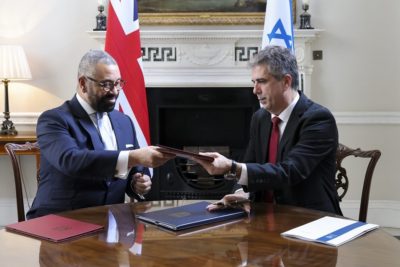Arms companies and immorality in education
ForcesWatch comment

This week the largest arms fair in the world will take place in East London. The Defence and Security Equipment International (DSEI) will be attended by more than 1500 defence exhibitors and traders, including those from authoritarian regimes or identified by the UK government as ‘human rights priority countries’, who have received official invitations. UK Government departments promoting these sales are also very present.
DSEI has attracted a record amount of protest this year – from an open letter signed by more than 250 academics to a mass of direct action at the exhibition centre, an art exhibition and education events. This reflects public disquiet with the activities of the companies that exhibit there and the license they are given by government to continue these activities.
What is less generally known is the increasing involvement of these same arms companies in education in the UK. Many of the top names have a presence – BAE Systems (who are also a ‘platinum sponsor’ of DSEI), Rolls Royce, Babcock, QinetiQ, Chemring and others; some are big players, forging the way ahead, others are playing a smaller part. These arms companies feature in the top 100 companies supplying defence equipment and military services globally listed by Defence News and the Stockholm International Peace Research Institute (SIPRI).
Many people would be surprised to hear that these companies are involved in the education of our children in the UK as its not a development that has been in the headlines. Our research on military interests in education details the extent to which this has developed and why. It looks at how the armed forces and other parts of the military, and arms companies and defence suppliers, are now influencers within schools and colleges, particularly within career-led and technical education.
Two recent developments are of concern – the growth of University Technical Colleges, which provide a mix of academic and technical education for 14-19 year olds, and the provision of STEM (science, technology, engineering and maths) activities for school students and young people by industry.
We are passionate about engineering and are proud to be supported by our industry partners, inc. @UniOfHull @BAESystemsplc @RoyalAirForce! pic.twitter.com/Y8jbd5pIGX
— Humber UTC (@HumberUTC) June 4, 2017
A sponsor or partner of a UTC is able to help shape the curriculum towards the needs of local employers and channel ‘work-ready’ young people directly into their own industry at the tax-payers expense.
Our research has found that 39% of the 49 University Technical Colleges (UTCs) currently open have significant arms company involvement, i.e., they are sponsored or partnered with one or more of the major arms companies. All but two of these 20 companies are listed in Defence News top 100 global arms companies.
Rolls-Royce is involved with six UTCs and BAE Systems is involved with four. Babcock and Qinetiq are both involved with two UTCs and Chemring, with one.
Some of the companies have a mixed portfolio, providing services to civilian sectors as well as defence. While one part of Babcock International partners UTCs as a defence and security company, another part, Babcock Education, is a major provider of education services across the UK.
Many of the colleges have the input of more than one arms company; three companies are involved with Bristol Technology & Engineering Academy and another four are involved in South Wilshire UTC.
The UK armed forces are not missing out on this opportunity. 35% of the 49 UTCs currently open have significant participation from the military, mainly in the form of employer partnerships and affiliations. For example, Bristol is affiliated to the Royal Navy and South Wiltshire works with the RAF and the Army as well as being affiliated to the Royal Navy. It is also supported by the UK’s Defence Science and Technology Laboratory at Porton Down.
Our analysis shows that military interests are involved with nearly half (49%) of UTCs open in September 2017, via either major arms company or the armed forces.
These military interests are also at work in schools more widely. The provision, and sponsorship, of STEM activities by arms companies and the military has become an industry in itself. For example, BAE Systems runs an education roadshow with the Royal Navy and RAF which looks at BAE technologies including drones. During 2017 the roadshow is scheduled to visit 400 UK schools. The Big Bang Fair which attracts groups of students from primary and secondary schools was sponsored in 2017 by top 100 arms companies BAE Systems, Rolls-Royce, Airbus, Leonardo, Thales as well as the Army, Navy, RAF and MoD. The dangers of skewing science and engineering in this direction are outlined by ForcesWatch and Scientists for Global Responsibility here and here.
Thanks for a great afternoon @BalernoHS 🙂 Super S1 pupils! @BAESApprentices @RAF_Jobs_Edin @RoyalNavy pic.twitter.com/1dQbn3nKHK
— Roadshow Team (@Roadshow_Team) September 8, 2017
Its not hard to see why military interests would be keen to make use of the opportunities presented to have an active involvement in education, or lobby for them to be created. Not only does it steer interested students towards a career in the defence industry or military and provide a mechanism for directly recruiting them, it helps to create an acceptance of military interests among young people and society at large. Their role as providers within education masks their primary purpose and blurs the boundaries between acceptable and unacceptable, ethical and immoral.
A new landscape has been created, where military interests are well represented in the state education system, where the unthinkable has become not only possible but uncontroversial and unchallenged
Ten years ago this may well have seemed unthinkable but a number of shifts in society and policy have created a new climate: the fragmentation of the education system and involvement of outside interests; the emphasis placed in government policy on career-led and technical education; and, the promotion of the military within education and society more widely. This is aided by a longer-held association of communities with companies which, while not unproblematic, yields jobs and security. A new landscape has been created, where military interests are well represented in the state education system, where the unthinkable has become not only possible but uncontroversial and unchallenged.
Arms companies, human rights and corruption
BAE Systems is the UK’s largest arms company and listed as third largest in the world. SIPRI lists that 93% of the company’s sales are from arms production including fighter aircraft, warships, nuclear missile submarines, tanks, armoured vehicles, artillery, missiles and small arms ammunition.job
BAE Systems are the main company implicated in the supply of arms from the UK which are being used by Saudi Arabia to attack the civilian population of Yemen, which has been well documented and condemned by many, including within parliament. The Campaign Against the Arms Trade (CAAT) state that:
Typhoon and Tornado aircraft, manufactured by BAE Systems, have been central to the attacks. The government has confirmed that they have been deployed on combat missions in Yemen. Throughout the bombing, further Typhoon aircraft have continued to be delivered to Saudi Arabia from BAE’s Warton site. Meanwhile, BAE and the UK government are pushing hard for a new contract.
CAAT also list corruption investigations against the company; the House of Lords ruled that these should be dropped because of national security interests. The company has paid fines or settlements in other cases.
BAE Systems have denied any sense of responsibility for what happens with the weapons they produce. When questioned by activist shareholders at the 2016 AGM, the Chairman, Sir Roger Carr, stated that:
‘We are not here to judge the way that other governments work, we are here to do a job under the rules and regulations we are given.’
He also claimed that the companies activities are ‘in the interests of peace for the world, rather than simply as aggressors. We maintain peace by having the ability to make war and that has stood the test of time’.
Rolls Royce produces engines for military aircraft engines, ships and submarines for over 100 countries. Defence News list it as the 15th largest arms company globally even though only around one quarter of its sales relate to defence sales.
Rolls Royce has also been accused of significant levels of corruption. Five years after Serious Fraud Office investigations started, the company settled out of court at the start of 2017, paying £671m to UK and Brazilian prosecutors to have the matter dismissed.
The judge who approved the Serious Fraud Office’s proposal to fine Rolls Royce rather than prosecute described the investigations, going back nearly 20 years, as ‘devastating and of the very greatest gravity’ for a ‘company of central importance’ to the UK. He said the investigations revealed ‘the most serious breaches of the criminal law in the areas of bribery and corruption’.
In 2014-15, BAE Systems, Babcock, Rolls Royce and Qinetiq together received nearly £10 billion of contracts from the UK government. This amounts to 8.5% of the government’s total expenditure for the year with external suppliers. Other companies that also major in defence received at least another 8%. While not all of the contracts will have been for defence or military services, these figures suggest how embedded these companies are with government. The political influence data produced by CAAT, on joint meetings and the ‘revolving door’ between arms companies, the military and the government, quantifies the extent of this.
The National Audit Office found in a 2016 report that defence companies including BAE Systems, Qinetiq and Rolls-Royce were among the companies providing the most gifts and hospitality to Government officials. The Daily Mail noted that, ‘If any area of spending needs to be above corruption, this is it. Our service personnel need to be equipped with arms chosen on merit alone.’
BAE Systems is ‘certainly, one of the most, if not the most immoral company on the planet’ as it ‘singlehandedly contributes to extraordinary immiseration and suffering around the world’.
Not only is it beginning to look like involvement in the education system is able to be bought on the same basis but there is no doubt that the cosy and intertwined relationship between the UK state and arms trade, under the mask of national interests, means that the UK government turns a blind eye to human rights abuses and is complicit in them, as this one example illustrates.
Perhaps the most succinct statement on the immorality of arms companies comes from Andrew Feinstein, author or The Shadow World: Inside the Global Arms Trade. Not only is BAE Systems, ‘certainly, one of the most, if not the most immoral company on the planet’ as it ‘singlehandedly contributes to extraordinary immiseration and suffering around the world’ but he details how corruption and government protection and privileging of such companies have allowed the arms trade to corrode ‘British democracy and rule of law’.
This privileging has also allowed the military and commercial interests linked to the arms trade to become embedded into our education system. This development and the inappropriateness of this relationship are similarly unscrutinised and the implications are not thought through. We need to protest against this whitewashing and influence as we protest against the arms trade and the far-reaching damage that it causes through the operation of its core business.
See more: military in schools/colleges, military in society, STEM, arms trade
Like what you read?
> Sign up for our newsletter or blog notifications
> Support our work – from just £2 a month










